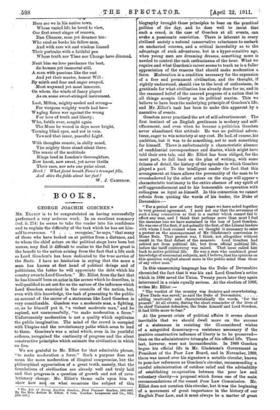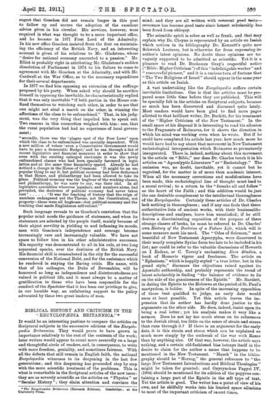GEORGE JOACHIM GO,SCBEN.* ME. ELLIOT is to be congratulated on
having successfully performed a very 'arduous work. In an excellent summary (vol. ii. 274) he seems to take the reader into his confidence and to explain-the difficulty of the task which he has set him- self to overcome. • "•I . . . recognise," he says, " that many of those who have looked on at politics from a, distance, and to whom the chief actors on the political stage have been but names, -may find it .sliffieultto realise:to the full how great is the benefit to the nation arising from the fact that a life such as Lord Goschen's has been dedicated to the true service of the , State. I have no ,hesitation in paying that the more a Man use Inown at first land of political doings and of politicians, the better he will appreciate the debt which his country owes to Lord Goschen." ,Mr. Elliot, from Ilse fact that he has himself been annetorinthe scenes which he describes, is well qualified to set. ontior us the nature of the influence which Lord Goschen exercised in the councils of the nation, but, even with this knowledge, the -task of presenting to the -public an account of the career of a statesman libe Lewd Gosehen is very considerable.. :Goschen was a -moderate man, a fighting, or, as he himself put -it, a violent moderate man," and he aspired, not unsuccessfully, "to make moderation a force." Unfortunately moderation is not a quality which captivates the public imagination. The mind of the crowd is occupied with Utopias and the revolutionary paths which seem to lead to them. Goschen's was a mind which, even in its youthful ardours, recognised the continuity of progress and the silent constructive principles which animate the civilisation in which we live.
We are grateful to Mr. Elliot for that admirable phrase, "to make moderation a force." Such a pinpose does not mean the mere moderation of illogical compromise, but the philosophical appreciation of a great truth, namely, that the foundations of civilisation are already well and truly laid and that progress is a question of growth and not of revo- lutionary change. Mr, • Elliot's theme calls upon him to show how and • on what occasions the subject of this • The Lifts of George Joachim Goechea, Oh* Viscount Gotctisn, 183.14907. By the lion. "Arthur D. Elliot. 2 vole. London: Longview' and Co., 1911. 1258. net.] biography bronghb these principles to bear on the practical politics of the slay, and he, does well to insist that snob. a creed, in 'the caw of Goschen at all events, can evoke n passionate conviction. There is inherent in every civilised society a natural conservative reluctance to embark en :nnoberted courses, and ,a, critical incredulity as to the Advantage of such. adventures, but in a hyper-sensitive age, when young men are dreaming dreams, something more is needed to control-the-rash enthusiasms of the hour. -What we restuireand what Geaelsen,:s career seems to teach 118 is a fuller appreciation of the reasons that should make moderation a force. Moderation is a. condition necessary for the expansion of a free and permanent civilisation, and the thought„if rightly vuderatOnd, should rise to the level of enthusiasm, in gratitude for what civilisation has already done for 413, and in the reasoned belief pf the assured progress of a nation that in all things accepts liberty as its political maxim. This we believe to have .been the nuderlying principle of, Goschen's life, and Xr. ,Elliot's task bps been to make this apparent .by a .nesTative of events.
Goebel' never practised the art of self-advertisement. The first instinct of an English _gentleman is modesty and self- effacement, and even when he became a politician Goseben never abandoned -this attitude. He was no political adven- turer, eager to win notoriety at any cost. Be had, of course, his Ambition, but it was to do something, not to seek.something for himself. There is unfortunately a characteristic absence of confidential correspondence and diaries, which might have told their own tale, and lir. Elliot has been obliged, for the most part, to loll back on the ;plan of :writing, -with some Solimse of detail, the history ,of the.episodes:in which Goschen played a part. To the intelligent reader the fact -that this arrangement at:times allows the personality of the man to be overshadowed•by the ,ether actors on the stage will appear a eliaracteristic testimony to the entire absence of any spirit of self-aggrandisement and to his honourable co-operation with colleagues as loyal.aebiosself. In-this. oonnection me cannot refrain from quoting the words of his leader, the Duke of Devonshire :— "Forsk period pow of over forty years we have acted together in very general agreement. I need not say that the severance of such a long connection as that is a matter which cannot fail to affect any man, and I think that perhaps more than most I feel the immense loss, we have sustained in the -loss of Lord Goschen. Re was one of the first, if net actually the first, of the Liberal leaders with whom I took counsel when we thought it,mscessary to raise a protest on the announcement of Mr. Gladstone's conversion to Home Rule. That protest was, I think, not altogether without .result in the final Afeat of the measure. Lord Goschen had retired not from political life, but from official political life, before the tariff controversy was .raised. That issue called him back to active political life. He was a man who combined groat knowledge of economical subjects, and, I believe,that his opinions on this question weighed almost more in the public mind than those of any other man."
In this unassuming language:has the Duke of Devonshire chronicled the fact that it was his and Lord Gosohen's action which in 1886 saved the Union. Twenty years later they again intervened in a crisis equally serious. At the election of 1906, writes Mr. Elliot " The verdict of the country was decisive and overwhelming `Free Trade was saved,' so said the Duke of Devonshire, adding cautiously and characteristically the words, 'for the present.' At all events, during the short remainder of the lives of its chief Unionist -defenders, the Duke himself and Lord Goschen, it had little more todear."
At the present crisis of political affairs it seems almost inevitable that we should dwell more on the success of a -statesman in resisting the ill-considered wishes of a misguided democracy—a resistance necessary if the positive constructive influence of liberty is to be preserved— than on the administrative triumphs of his official life. These last, however, were not inconsiderable. In 1868 Goschen began his official life in Mr. Gladstone's Government as President -of the Poor Law Board, and in November, 1869, there was issued over his signature a notable circular, known to poor-law reformers as Goschen's circular, recommending a careful administration of outdoor relief and the advisability of establishing co-operation between the poor law and voluntary charity—a proposal which forms one of the main recommendations of the recent Poor Law Commission. Mr. -Elliot does not mention this circular, but it was the beginning of a movement of great importance in the history of our English Poor Law, and it.must always be a matter of great ' regret that ,Goschen did not remain longer in this post to follow up and secure the adoption of the excellent advice given in his circular. His services, however, were required in what was thought to be a more important office, arid he became in 1871 First Lord of the Admiralty. In his new office Goschen insisted from the first on maintain-
ing the efficiency of the British Navy, and an interesting account is given of his relations to Mr. Gladstone, whose " desire for national -economy amounted to a. passion." Mr. Elliot is probably right in attributing Mr. Gladstone's sudden dissolution of Parliament in 1874 to his •failure to come to agreement with Mr. Goschen at the Admiralty, and with Mr.
Cardwell at the War Office, as to the necessary expenditure for their several departments.
In 1877 we find him opposing an extension of the suffrage proposed by his party. When asked why should he sacrifice himself in opposing the inevitable, he characteristically replied that it was only inevitable " if both parties in the House con- fined themselves to watching each other, in order to see that one might not steal a march on the other, in winning the
4ffectioas of the class to be enfranchised." That, in his judg- ment, was the very thing that impelled him to speak out. Two reasons in this connection weighed with him : one, that the rural population had had no experience of local govern- .ment ; "secondly, there was the 'plague spot of the Poor Laws' upon which the Blass to be enfranchised was specially dependent. With a new million of voters even a Conservative Government would have to pass a democratic Budget,' and he ran through a list of recent legislative and financial measures in order to show that even with the existing enlarged electorate it was the newly enfranchised classes who had been specially favoured in legis- lation and at the same time financially spared. Already he had noticed a change in the House of Commons. It might be an un- popular thing to say it, but political economy had been dethroned in that House, and philanthropy had been allowed to take its place. Political economy was the bugbear of the working classes, and philanthropy, he was sorry to say, was their idol. In all legislative assemblies wherever numbers, and numbers alone, had prevailed, the doctrines of political economy had never taken
root' It was the teaching of history that the reign of numbers endangered not the Throne, not the Constitution, not property—these were all bugbears--but ;political economy and the teaching that made Englishmen self-reliant.'
Snob language reveals to us Goschen's conviction that the popular mind needs the guidance of statesmen, and when its statesmen are selected by the people itself, mainly because of their abject servility in yielding to and inflaming its moods, men with Goschen'a independence and courage become increasingly rare and increasingly valuable. We have not space to follow him in his other administrative successes. His capacity was demonstrated to all in his rnle, at two long separated epochs, over the destinies of the British Navy.
His financial skill is remembered in the city for the successful conversion of the National Debt, and for the assistance which he rendered in staying the Baring crisis. His name, with that of his colleague, the Duke of Devonshire, will be honoured so long as independence and disinterestedness are valued in political life, and it must always be a matter of gratification to those who have been responsible for the .conduct of the Spectator that it has been our privilege to give, in our humble way, an unfaltering support to the policy advocated by these two great leaders of men.







































 Previous page
Previous page